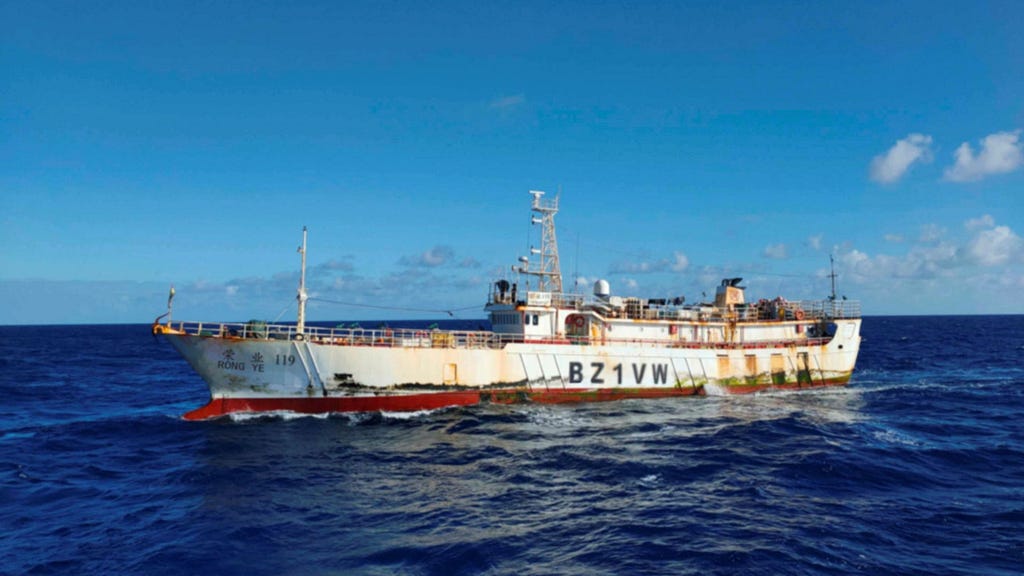China’s fishing fleet, a vast, state-subsidized operation, spans across the Pacific, Atlantic, and Indian Oceans, providing millions of jobs, substantial profits, food security, and a valuable export commodity. The Chinese seafood market is estimated to generate around 1 trillion kronor annually, underscoring its economic significance. However, the precise size of the fleet remains elusive, with estimates varying between 3,000 and 6,000 vessels operating in distant waters. This lack of transparency is symptomatic of a broader problem within the global fishing industry, where approximately 75% of large fishing vessels are untraceable on international tracking platforms. This opacity obscures the true origins of catches and the conditions under which they are obtained, often masking exploitative labor practices and environmental degradation.
The 2017 Galapagos incident, where a Chinese cargo ship was intercepted carrying over 7,000 sharks destined for the fin trade, significantly tarnished China’s reputation. This incident highlighted the illegal fishing practices employed by some segments of the Chinese fleet. The Environmental Justice Foundation (EJF) has documented a pattern of serious, systematic illegal fishing and human rights abuses linked to the Chinese distant-water fleet. The EJF emphasizes the scale of the Chinese fleet, the largest globally, and its disproportionate involvement in illegal activities, including finning, using dolphins as bait, fishing in restricted areas, and utilizing illegal mesh sizes. While it remains unclear whether these operations are actively orchestrated by Beijing or simply overlooked, the Chinese government’s typical response to presented evidence of illegal fishing by state-subsidized companies is outright dismissal.
China defends its fishing practices, arguing it is a responsible fishing nation and highlighting the historical role of Western fleets in contributing to current ocean depletion. While much of China’s fishing activity is legal, the EJF stresses the challenges posed by unregulated fishing on the high seas and the escalating global demand for seafood, which has doubled since the 1960s. This demand, coupled with a lack of effective oversight, has led to the overexploitation of a third of the world’s fish stocks, according to the UN Food and Agriculture Organization. This underscores the urgent need for greater transparency and stricter regulations within the global fishing industry.
The intensive fishing of jumbo squid (Humboldt squid) by Chinese vessels off the coast of South America provides a stark example of these challenges. The large-scale operations of the Chinese fleet, comprising around 300 vessels, are impacting local Peruvian fishermen who are losing their livelihoods due to declining squid catches. While the Chinese government attributes the decline to changes in ocean temperature, experts like Juan Carlos Riveros, a biologist with Oceana, point to overfishing as the primary culprit. The industrial scale of Chinese fishing, facilitated by vessels like the Ping Tai Rong Leng 1, a refrigerated cargo ship capable of storing vast quantities of fish and resupplying smaller fishing boats, allows for continuous operation at sea, outcompeting local, smaller-scale fisheries. Data from Global Fishing Watch illustrates the extensive reach of these operations, with vessels like the Ping Tai Rong Leng 1 engaging in numerous at-sea transfers with smaller fishing boats, some of which haven’t visited a Chinese port for extended periods.
To circumvent restrictions and avoid detection, Chinese fishing vessels have increasingly adopted flags of convenience, registering under other nations’ flags. In Argentina, where Chinese vessels previously faced scrutiny for illegal fishing within territorial waters, the government has begun granting fishing permits to Chinese-owned vessels operating under the Argentinian flag. This practice, documented by The Outlaw Ocean Project, has extended globally, with China controlling hundreds of vessels flagged to countries like Ghana, Senegal, Kenya, and others, allowing them access to diverse fishing grounds. This strategy further complicates efforts to monitor and regulate the activities of the Chinese fishing fleet, highlighting the need for international cooperation and stricter enforcement of existing regulations.
Beyond the ecological impact, human rights abuses are also prevalent within the Chinese distant-water fishing industry. Accounts from Indonesian migrant workers onboard these vessels reveal abhorrent working conditions, inadequate food and water, physical violence, and even fatalities. These abuses underscore the urgent need for greater transparency and accountability within the industry. The EJF advocates for mandatory unique vessel identification numbers, akin to vehicle registration plates, to track vessels throughout their lifespan, regardless of name changes. Increased import controls, particularly within the EU, which imports 60% of its fish, are crucial to preventing illegally caught seafood from entering the market. Consumers also have a role to play by demanding transparency and traceability from seafood vendors, ultimately leveraging their purchasing power to drive change within the industry.














